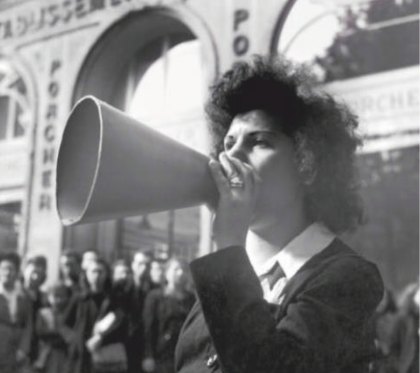When she first put a toe on the streets, in the mid-1930s, there were 30 others. It was a competitive business, but she could not cut her prices; at 20 francs a go, she needed to sell 100 scores at each performance just to pay the rent. Luckily she was healthy and her voice strong, since she stayed out for 12 hours a day and in most weathers— even in temperatures of ten degrees below, when people would run out of cafés with mulled wine to warm her up.
20世紀(jì)三十年代中期,當(dāng)莉莉第一次走上街頭時(shí),那里還有其他30個(gè)人。這是個(gè)很有競(jìng)爭(zhēng)性的生意,但是她不能降價(jià),每次20法郎,她需要在每場(chǎng)演出中賣出100個(gè)樂(lè)譜才能支付租金。幸運(yùn)的是,她很健康,聲音也很有力,因?yàn)樗刻煲谕饷娲羯?2個(gè)小時(shí),在大多數(shù)天氣里-即使是在零下十度的溫度下,人們也會(huì)拿著熱紅酒從咖啡館里跑出來(lái)讓她暖和起來(lái)。
War interrupted things, but after that great Liberation day in August 1944, when she belted out “La Marseillaise” as de Gaulle appeared on the Champs-Elysées and found the crowd joining her, she knew she had arrived. Her timing seemed strange to some, just as her metier was fading. But singing made her feel free; and what she was doing was important. She was continuing a long tradition of popular songs in the street, one first organised in the revolution of 1789 to stir up citizen spirit and raise morale.
戰(zhàn)爭(zhēng)中斷了一切,但在1944年8月那個(gè)偉大的解放日之后,戴高樂(lè)出現(xiàn)在香榭麗舍大街上,她高唱著《馬賽曲》,發(fā)現(xiàn)人群加入了她。她知道自己成功了。對(duì)一些人來(lái)說(shuō),她成功的時(shí)機(jī)似乎很奇怪,因?yàn)樗膶iL(zhǎng)正在消失。但是唱歌使她感到自由;她所做的事情很重要。她延續(xù)了街頭流行歌曲的悠久傳統(tǒng),第一次是在1789年的革命中組織起來(lái)的,目的是激發(fā)公民精神,提高士氣。

She thought of herself as a teacher, promoting songs (a few new ones, like “La Mer”, mixed in with the old), getting the people to learn them, and selling them scores so that they could practise at home. It was a truly communal enterprise. Another favourite pitch was outside the giant Renault factory in the suburbs, where at midday when the siren sounded a wave of workers in blue overalls would stream out and, with luck, cluster round her, chewing their casse-croûte as they listened.
莉莉?qū)⒆约阂曌饕粋€(gè)老師,發(fā)揚(yáng)歌曲(有一些新的歌曲,比如《大海》,與舊的歌曲混在一起),讓人們?nèi)W(xué)習(xí)它們,賣給他們樂(lè)譜,這樣他們就可以在家里練習(xí)了。它是一個(gè)真正的公有企業(yè)。另一個(gè)最受歡迎的地方是郊區(qū)的雷諾大型工廠外,正午警報(bào)響起時(shí),一波又一波身穿藍(lán)色工作服的工人就會(huì)涌出來(lái),運(yùn)氣好的話,就圍在她身邊,一邊聽(tīng)著,一邊吃著他們的便餐。
譯文由可可原創(chuàng),僅供學(xué)習(xí)交流使用,未經(jīng)許可請(qǐng)勿轉(zhuǎn)載。












